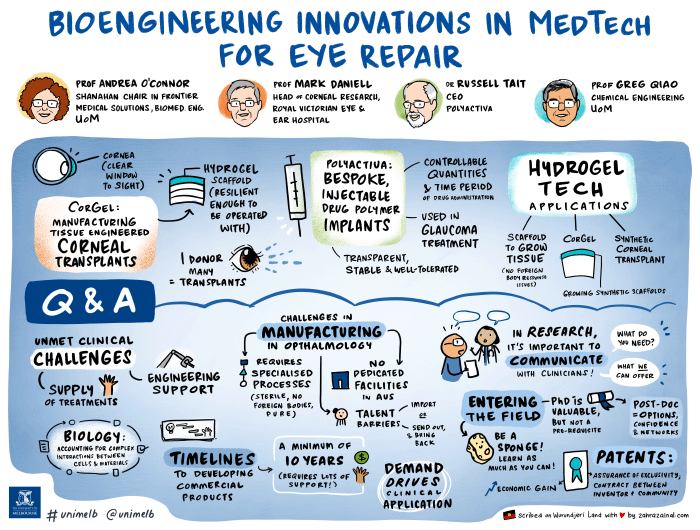Bioengineering innovations for eye repair
View a video of the panel discussion held on Wednesday 1 September 2021.
Panel discussion
Innovations in medical technologies are providing new and improved ways to prevent, diagnose and treat vision loss and blindness caused by conditions such as glaucoma, diabetic eye disease, age-related macular degeneration, or injury. This panel will bring together clinical, engineering, and industry experts to discuss current clinical and research challenges in this field, as well as some of the bioengineering strategies being developed to tackle vision loss and improve outcomes for patients.

Panelists
Andrea O’Connor
Shanahan Chair in Frontier Medical Solutions, Biomedical Engineering, The University of Melbourne
Andrea is the Shanahan Chair in Frontier Medical Solutions a Redmond Barry Distinguished Professor in the Department of Biomedical Engineering and leads the Tissue Engineering Group at the University of Melbourne. She was a Fulbright Scholar at Massachusetts Institute of Technology in 1995–96.
Her research is focussed on design, synthesis and fabrication of biomaterials, porous materials and antimicrobial nanomaterials. She is particularly interested in strategies for scale-up of tissue engineering including vascularisation, and design of antimicrobial materials for medical implants. She has published over 90 journal articles, co-authored the chapter on Tissue Engineering for the major reference work ‘Plastic Surgery’ edited by Neligan and Gurtner, lectured on tissue engineering and biofabrication at the Bayreuth International Summer School, Germany, and was a finalist in the 2017 Graeme Clark Institute HealthTech Innovation Challenge. Andrea also led the engineering team on the world-first Neopec clinical trial of breast reconstruction using tissue engineering, showing proof-of-principle of tissue engineering of large volumes of well vascularised fat tissue. She collaborates with a range of hospitals, medical research institutes and medical device companies to improve existing products, develop new devices and solve clinical problems.
Mark Daniell
Head of Corneal Research, Royal Victorian Eye and Ear Hospital
Mark is a senior consultant at Royal Victorian Eye and Ear Hospital, serving as Head of the Corneal Service since 2011, and overseeing a team of surgeons performing corneal transplantation for Victoria. He has a significant research interest in a bioengineered cornea, developing the concepts for this project and being the driving force gathering together the collaboration partners.
He has had successful collaborations with numerous groups both nationally and internationally, including an ongoing project with Professor Greg Qiao at the University of Melbourne and Professor Damien Harkin at QUT on tissue engineering for the eye. He has supervised several postgraduate students in the field of tissue engineering.
He is the founding Chair of the ANZ Corneal Society and Medical Director of the Lions Eye Bank. Previously he was Head of Ophthalmology at the Royal Melbourne Hospital (2003–2011).
Russell Tait
CEO, Polyactiva
Russell has been CEO since February 2010, and joined the board of PolyActiva in August 2011. He is a co-inventor of PolyActiva’s technology. He is currently an adjunct Associate Lecturer at Monash University in the Faculty of Pharmacy and Pharmaceutical Sciences at the Victorian College of Pharmacy, Australia. Russell has more than 20 years’ experience in drug delivery and pharmaceutical product development with leading pharmaceutical companies, including Glaxo Australia, Faulding (now Hospira) and CSIRO. Whilst at CSIRO, he was the recipient of the CSIRO medal for Business Excellence for having led the team responsible for publishing the CSIRO Total Well Being Diet book. He was appointed Chief Executive Officer of PolyActiva Pty Ltd in February 2010. Russell holds degrees in Pharmacy from the Victorian College of Pharmacy, University of Melbourne and is a registered pharmacist. He also took a post-doc position at Kansas University.
Greg Qiao
Chemical Engineering, The University of Melbourne
Greg is a Professor in the Department of Chemical Engineering and Associate Dean (Research Training) in the Faculty of Engineering and Information Technology. The research interests of Greg Qiao are in synthetic polymer chemistry and their applications.
The key research areas are in novel macromolecular architectures, new activation methods for RAFT process, structurally nanoengineered antibacterial peptide polymers (SNAPPs), Peptide eco polymers as alternative plastics, soft tissue engineering scaffolds especially on synthetic cornea, polymeric gas membranes, and chemical engineering products.
Prof Qiao was an Australian Research Council’s Future Fellow (2012–2015). He is a Fellow of RACI and RSC. Prof Qiao was the Chair of Polymer Division of the RACI (2015–2016) and a member of ARC College of Experts (2016–2018). Prof Qiao received RACI Applied Research Award in 2017, ExxonMobil Award of Excellence for Chemical Engineering in 2015, RACI’s Polymer Division Citation in 2011 & 2019 and Freehills Award in 2010.